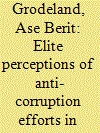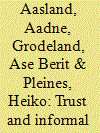| Srl | Item |
| 1 |
ID:
095020


|
|
|
|
|
| Publication |
2010.
|
| Summary/Abstract |
Anti-corruption efforts introduced in Ukraine in recent years have predominantly been imposed from the outside. They have been vague, all-inclusive and lacking in political and public support. What is more, they have been fairly insensitive to the cultural context into which they have been introduced. While targeting corrupt behaviour, they have largely ignored its root causes. The impact of Ukrainian anti-corruption reform has therefore been limited. Drawing on extensive qualitative data from Ukraine, this article explores elite (i) perceptions of Ukrainian anti-corruption reform, (ii) familiarity with specific anti-corruption initiatives, and (iii) views on how best to combat corruption. Not surprisingly, Ukrainian elites are familiar with, and fairly negative in their assessment of, national anti-corruption reform. They advocate a number of measures targeting corrupt behaviour as well as its root causes with a view to reducing corruption in Ukraine".
|
|
|
|
|
|
|
|
|
|
|
|
|
|
|
|
| 2 |
ID:
110024


|
|
|
|
|
| Publication |
2012.
|
| Summary/Abstract |
The article examines patterns of generalised and institutional trust among elites in East Central Europe, South East Europe and the West Balkans. It enquires into the extent to which such trust can predict elite perceptions and behaviour concerning informal practice. The article builds on surveys of elite representatives in seven post-socialist states. Survey findings are complemented with and illustrated by findings from qualitative in-depth interviews. It emerges that neither institutional nor generalised trust can serve as strong predictors of informal behaviour or of informal practice. The linkages between trust and informal practice are then discussed with reference to elites' own experiences with the past legacy and post-socialist society.
|
|
|
|
|
|
|
|
|
|
|
|
|
|
|
|